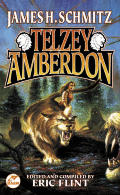
| Publisher: | Baen |
| Copyright: | March 2000 |
| Printing: | February 2002 |
| ISBN: | 0-671-57851-0 |
| Format: | Mass market |
| Pages: | 436 |
I've been reading a lot of dark, intense, and literary books lately and felt like a break and something lighter, so I turned to this book, which I picked up on a whim in the bookstore after reading Susan Stepney's review.
James H. Schmitz was a prolific and much-loved author of SF short fiction in the 1960s and early 1970s, who has since fallen almost completely off the radar of SF readers due in part to the difficulty of staying in print as a primarily short-fiction writer with only a couple of novels. This is the first of a series of Baen paperbacks collecting Schmitz's short fiction, edited by Eric Flint and Guy Gordon. This volume includes all of the stories from The Universe Against Her and The Lion Game, as well as a few other stories and an afterword and background essay by the editors.
The hero and title character, Telzey, is a fifteen-year-old law student in the far-future universe of a star-spanning loose federation called the Hub. She discovers in the first story that she has previously unknown psychic powers, which develop considerably over the course of the collection. The stories are space opera, not particularly challenging or deep, generally built around a puzzle that Telzey has to figure out or a villain that she has to defeat, but they're still notable for a couple of reasons.
First, Schmitz has a good grasp of pacing and mostly avoids the infodump, dropping one into both the world and the action without a lot of preliminaries. The details of the world are left to the background, and yet while the structure of Telzey's world felt sketchy, I never felt confused by it. Similarly, while the stories often pose ethical challenges, Telzey simply makes her decisions and the reader is left to agree or disagree as they choose, without the extended defense of good and evil so often seen in space opera. Schmitz as the writer adroitly gets out of the way and letting the reader read the story.
Second, Schmitz writes strong, capable female heroes without any fanfare, and in fact without making gender an issue at all. There are only a couple of points where the gender of the characters matters, character traits are attributed to the characters rather than their genders, and traditional gender roles are neatly ignored without any self-consciousness. This is so subtly done that I likely wouldn't have noticed without reading various reviews and analyses of Schmitz's work, which is even more remarkable given that these stories were mostly written in the 1960s and early 1970s.
I'm not sure if I'll pick up any more of these collections. The stories were generally competent but didn't particularly grab me, and I think there's a lot of better science fiction out there. There is, however, also a lot worse science fiction out there, and this isn't a bad choice if you're in the mood for light space opera.
"Novice": Telzey discovers her powers, with the help of a crest cat. The crest cats are the best aliens in the whole collection, but sadly appear only in this first story. I'd love to see more of them. The story itself, unfortunately, is marred by the annoying evil aunt and a completely unbelievable ending. (5)
"Undercurrents": Telzey untangles a plot against her friend while further developing her psychic abilities and playing cat-and-mouse with the Psychology Service. It's weird to read a story these days where the mysterious, powerful government bureaucracy keeping secrets from the general population is actually not really a villain. This was a fun story, although I kept being jarred by the casual attitude towards telepathic ethics. (6)
"Poltergeist": Telzey discovers telepathic menace and deals with it. Not much meat here, although ethics are touched on a bit more directly. (5)
"Goblin Night": A pretty straightforward story about Telzey blundering into a trap and then escaping it. The villain seemed pretty cliched to me. (5)
"Sleep No More": A chilling story about a telepathic hunter, marred by a resolution that I couldn't bring myself to swallow and the trivial ease with which Telzey makes herself invulnerable to any recurrences. If it was that easy, why didn't she do it earlier? (6)
"The Lion Game": This one would make a great setting for a role-playing adventure. A series of isolated tunnels linked by teleport gates of completely reconfigurable geometry, alien species fighting running battles for territory and gate control, Telzey and other innocents and captive species caught in the middle and under mental attack from both sides, and lots of treachery, internal factions, and untrustworthy characters to liven up the mix. The best story of the collection. (6)
"Blood of Nalakia": A woman tries to get away from a powerful telepath with the help of another untrustworthy character. Not much here. (4)
"The Star Hyacinths": Well, there is a story here once the characters finally stop infodumping at each other, but it takes forever to get to it and by that time you feel like the whole thing has been painstakingly explained to you anyway. There are a few plot twists that salvage it a little, but I really wish more would have been shown instead of described in dialog. And what was with the scene breaks? I don't know if this was an editing problem, but there were blank lines and even scene break markers right in the middle of conversations, with the characters picking up afterwards without any elapsed time or change of topic. (4)
Reviewed: 2004-09-18